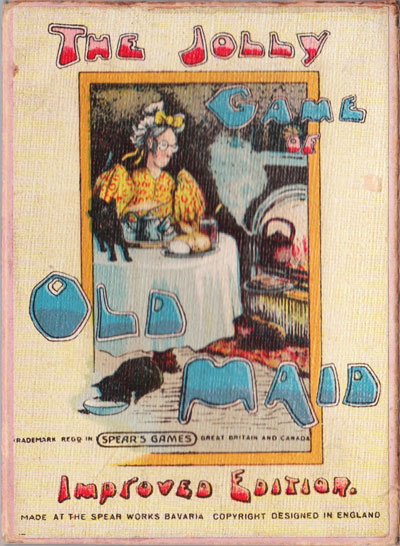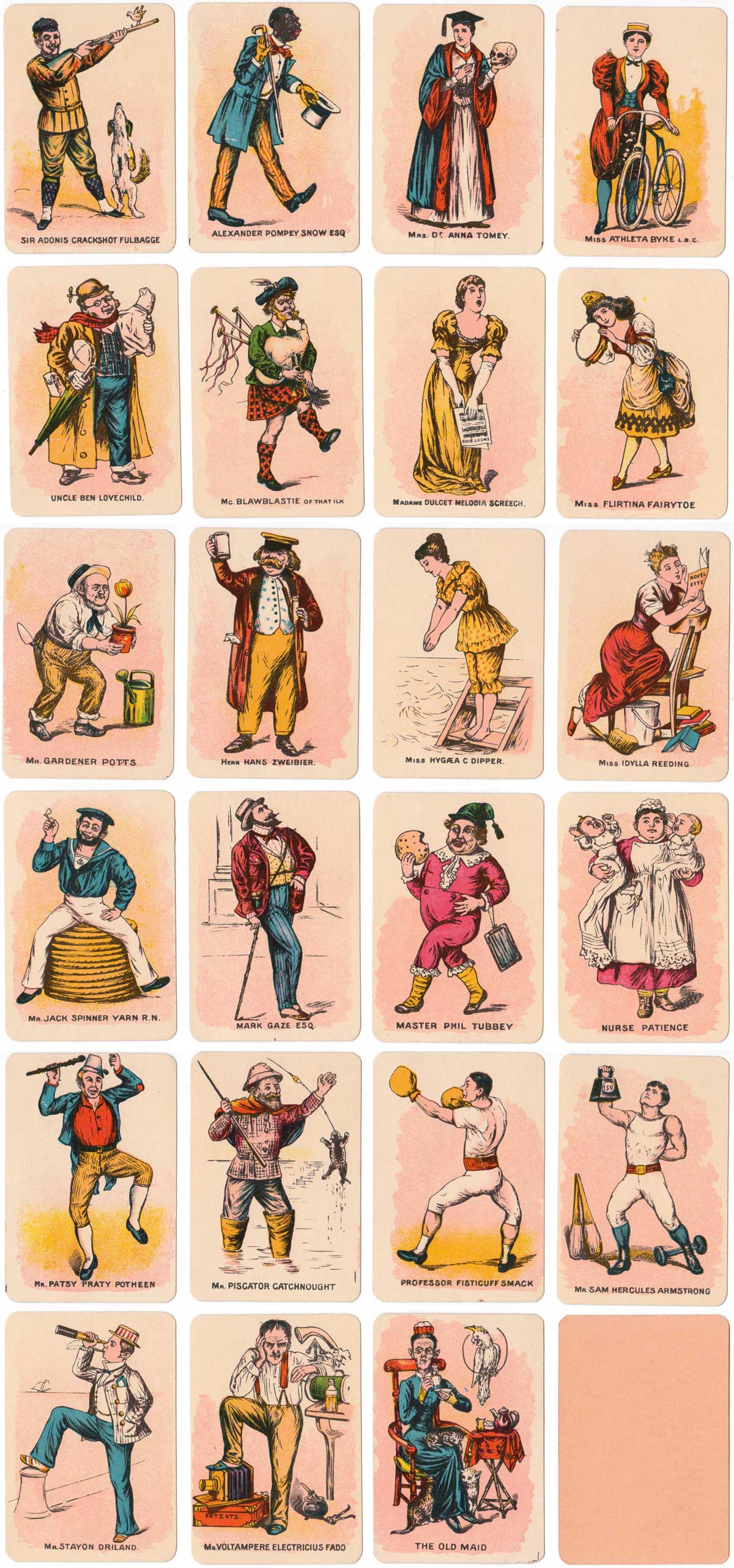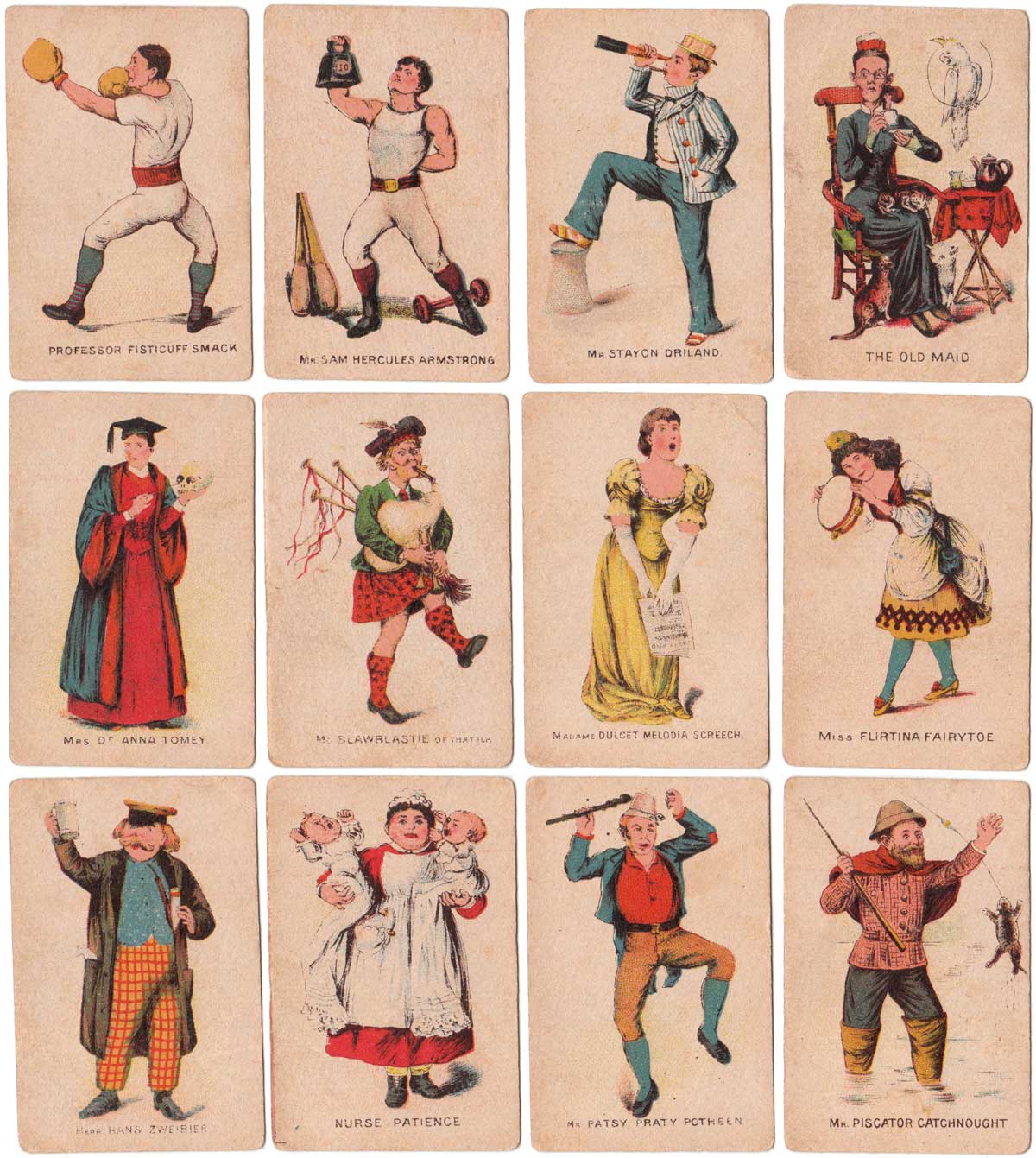Spear’s Old Maid
Spear’s “The Jolly Game of Old Maid” was introduced around 1900. The cards contain some interesting but harmless social stereotypes from the end of the Victorian era.

Spear’s “The Jolly Game of Old Maid” was introduced around 1900 and comes in many sizes and card qualities. The images on the cards contain some interesting but harmless social stereotypes from the end of the Victorian era, mostly in a “jolly” mood, with matching comical names. There are plenty of funny characters, costumes and an early bicycle. The main focus of the game is towards the last card, an Old Maid shown here having tea with three cats and a parrot. The player who ends up holding this card is the loser.
The edition shown here, from around 1910, is reckoned on the box to be an “Improved Edition”. This probably refers to the print quality and more rounded corners than earlier editions. The backs are still plain pink. A smaller sized version was also produced.

Above: the Jolly Game of Old Maid published by Spear's Games, c.1910, manufactured at the Spear Works in Bavaria.
Smaller Size Version

Above: small size edition, 50mm x 75mm, 33 card pack on very poor quality card. Plain backs. These may have been a pocket money buy during the first world war. I can’t thinks of any other reason for them.

By Rex Pitts (1940-2021)
Member since January 30, 2009
Rex's main interest was in card games, because, he said, they were cheap and easy to get hold of in his early days of collecting. He is well known for his extensive knowledge of Pepys games and his book is on the bookshelves of many.
His other interest was non-standard playing cards. He also had collections of sheet music, music CDs, models of London buses, London Transport timetables and maps and other objects that intrigued him.
Rex had a chequered career at school. He was expelled twice, on one occasion for smoking! Despite this he trained as a radio engineer and worked for the BBC in the World Service.
Later he moved into sales and worked for a firm that made all kinds of packaging, a job he enjoyed until his retirement. He became an expert on boxes and would always investigate those that held his cards. He could always recognize a box made for Pepys, which were the same as those of Alf Cooke’s Universal Playing Card Company, who printed the card games. This interest changed into an ability to make and mend boxes, which he did with great dexterity. He loved this kind of handicraft work.
His dexterity of hand and eye soon led to his making card games of his own design. He spent hours and hours carefully cutting them out and colouring them by hand.
Related Articles

Scientific Whist
“Scientific Whist” : standard cards with instructions for play on the faces by Chas Goodall & Son, 1...

Agent Provocateur
Branded lingerie collection in a pack of pin-up playing cards.

Nimbus playing cards
Mike Steer’s weather-themed pack with suits in four colours and backs for cardistry.

Agatha Christie and Playing Cards revisited
Agatha Christie uses card-play as a primary focus of a story, and as a way of creating plots and mot...

The Decadent Deck
Studies in the eroticism of the female body by Inge Clayton.

Historic Shakespeare
“Historic Shakespeare” playing cards featuring Shakespearean characters by Chas Goodall & Son.

CARD-AB Miltenberg
Illustrations by Rita Stern depicting notable landmarks and scenes from the town of Miltenberg in Ge...

Copechat Paramount Sorting System
Preserving the past: a specimen deck showcasing edge-notched cards and their ingenious sorting syste...

Heartsette by Herbert Fitch & Co, 1893
A glimpse into a busy print and design office in late Victorian London.

New Altenburg Skat cards – German DDR Pattern
Authentic Altenburger Skat cards with German suits (Acorns, Hearts, Leaves, Bells).

Rap Rummy
Rap Rummy made by Parker Brothers in 1926, only 4 years after the discovery of King Tutankhamen’s to...

German Travel Cards
A travel-themed educational deck helping American tourists visiting Germany.

Batman® playing cards
Batman playing cards published by InterCol of London 1989.

Can You Believe Your Eyes?
“Can You Believe Your Eyes?” playing cards featuring visual illusions & other oddities.

Pastime Playing Cards for the Blind
The “Pastime” Playing Cards for the Blind manufactured by Goodall & Son Limd., c.1910.

The European Interchanges Quartets
A card game based around motorway intersections from European countries.
Most Popular
Our top articles from the past 28 days

